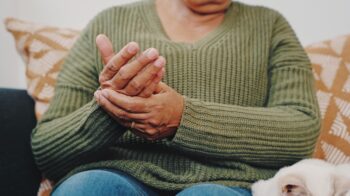I was misdiagnosed with ulcerative colitis

By Jenna Pettit, Guest Contributor
For most of us with chronic illnesses, a big part of the journey is receiving a diagnosis. It’s that recognition that there really is something wrong and we are not just making up our symptoms.
But receiving the wrong diagnosis can feel just as frustrating as not having a diagnosis at all. It can affect the type of treatment we receive. It can also affect how people respond to us, or even how we view ourselves.
Pain, fatigue and fear: My first flare-up
In February of 2016, at 21 years old, I was hospitalized for a week with my first inflammatory bowel disease (IBD) flare-up. I was malnourished, fatigued, in excruciating pain, and could barely hold my bowels for more than five minutes.
A team of gastroenterologists (GIs) monitored my health and did the standard procedures, such as an endoscopy, colonoscopy, and stool samples to see what was wrong. I started to hear the terms ulcerative colitis (UC), Crohn’s disease (CD) and C. Diff. for the first time. I remember waking up from my first colonoscopy and hearing the words, “Your colon shows signs of Crohn’s disease” from the GI doctor, and statements from loved ones like, “I really hope it’s not Crohn’s disease.”
I was scared. So many thoughts were racing through my head. What does this all mean? How is this going to affect my future? Is this my fault?
My endoscopy showed signs of gastritis and my colonoscopy showed signs of pancolitis and inflammation in my terminal ileum. Usually, having inflammation throughout the GI tract is a sign of Crohn’s disease, but my doctors said it was still not conclusive. They ordered an IBD panel, and it came back saying I had ulcerative colitis, so from February 2016 to June 2017, that was my diagnosis: ulcerative colitis.
What I didn’t want to hear
During my first flare-up, I missed about a month of work and about two weeks of school. I was a junior in college, getting my undergrad degree in communicative disorders. It was definitely one of my toughest semesters. I also worked as a group fitness instructor, and my absence was definitely noticed since I worked with large groups of people.
It took a lot for me to open up about what was going on. I stayed connected with a lot of my gym members and college classmates through social media, so when I finally had a diagnosis, I decided to open up online about what had been going on with my health.
I was very surprised by some of the perhaps well-intentioned, but ignorant comments I received. I think many people really just didn’t know what to say.
For that reason alone, I needed to surround myself with people who would understand. I learned to cope with all that ignorance by finding a community of people with UC and CD through Instagram.
On Instagram, we refer to ourselves as Warriors. We are UC and CD Warriors. I wanted their advice, experiences, and perspectives. I wanted to know how they dealt with ignorance.
The trouble with misdiagnosis
From January 2017 to June 2017, I had a flare-up throughout my GI tract. On June 8, I had an endoscopy and a colonoscopy. The scopes showed inflammation in my esophagus, gastritis, and signs of active disease in my ileum and colon. By the end of June, I was hospitalized.
A team of GIs revisited my health records. I was taking HUMIRA at the time, but unfortunately, my body was building antibodies towards the medication.
I remember lying in my hospital bed when one of the GIs on call came to my room. After a discussion with several of his colleagues, he said my results and symptoms were more consistent with Crohn’s disease.
The doctors also wanted to change my treatment. They wanted to try a biologic called Stelara.
UC and CD are very similar; however, they have slight differences, and it is important to get the right diagnosis. Here’s a perfect example of why:
Even though my doctor had prescribed Stelara, it took about four months to get it approved by my insurance company because Stelara was only approved for people with Crohn’s disease.
Sure, the doctors finally agreed that I had Crohn’s disease. But most of my medical reports at the time said ulcerative colitis. So it was a challenge to prove to my insurance company that I actually had CD.
Being my own advocate
Being my own advocate was what helped me get through my misdiagnosis. I did a lot of research on the differences between ulcerative colitis and Crohn’s disease. I also talked with a variety of people living with the conditions.
It turns out I wasn’t the only person who had to deal with this kind of misdiagnosis. In a recent survey of people with inflammatory bowel disease, 1 in 10 Crohn’s patients stated they had been misdiagnosed with ulcerative colitis.
Now, more than two and a half years since my first IBD diagnosis, I realize I’m going to deal with a lot of ignorance. As Warriors, we have to be mentally strong to deal with the ignorance—and the physical warfare our bodies are under, and also the emotional toll IBD takes on us.
Something that has really helped me was finding a community. It helped to surround myself with people who empower me and who understand what I’m going through. That is a huge piece to coping with this illness. We are stronger when we deal with this together.


